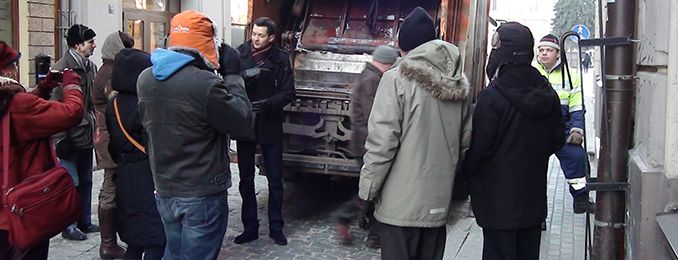
Waste Management Know-how to the Baltic Countries
Know-how related to waste management is being exported to Estonia and Latvia in the WastED project coordinated by TUAS. Waste management education is facilitated using Innovation Pedagogy—a learning approach developed at TUAS.
In bringing about a recycling society there are many steps to be taken. Globally, over one billion tons of waste is produced in households, averaging 1.2 kg per person per day. This is expected to double by 2025.
In order to avoid overloading the planet with waste and to decrease the use of scarce natural resources, the waste that is produced should be seen as a resource instead of a nuisance to be dumped in landfills. The objective—as stated in the EU Waste Directive—is primarily to decrease the amount of waste and then to find reuse possibilities as either a material or energy source. Only after all other options have been investigated should waste be located in a landfill.
To meet the objectives in waste management, the education of operators who work and have an interest in waste management is needed. Education in waste management is still rare, despite the rapid development of the sector and the growing demands set by, for example, the EU.
Innovative learning methods
The WastED project’s programme is targeted at trainers and operators who work in waste management, such as associations, industry groups, ministries or other governmental, non-governmental or public interest groups, whose aim is to increase awareness and know-how of waste management professionals. The WastED educational programme can equally be suited for educational institutes providing training in waste management.
The educational programme developed by the project consists of eight study modules which can be tailored according to customers’ needs. The modules handle waste management operators and their responsibilities, workplace safety, logistics, hazardous waste and communication.
The study programme on waste management applies Innovation Pedagogy—a learning approach developed at TUAS. Innovation Pedagogy emphasises the active role of students, and is based on experimentation, the sharing of information and integrating different viewpoints. Innovation Pedagogy aims to generate a readiness to innovate in students by integrating teaching, research and development as well as cooperation with working life players.
Piloting in Estonia and Latvia
The WastED programme has been jointly developed by leading environmental education institutions in Finland. TUAS has shared its resource efficiency know-how and the pedagogical insights of Innovation Pedagogy, the Environmental School of Finland SYKLI has contributed with their knowledge on waste management and HAAGA-HELIA University of Applied Sciences has helped to package and internationalise the service product.
The study modules are currently being piloted in Estonia and Latvia, after which they can be transferred to other countries and exported as an education service product representing the high-level know-how of Finnish educational institutes.
Text: Project Managers Martti Komulainen and Henna Knuutila
Photo: Sami Lyytinen